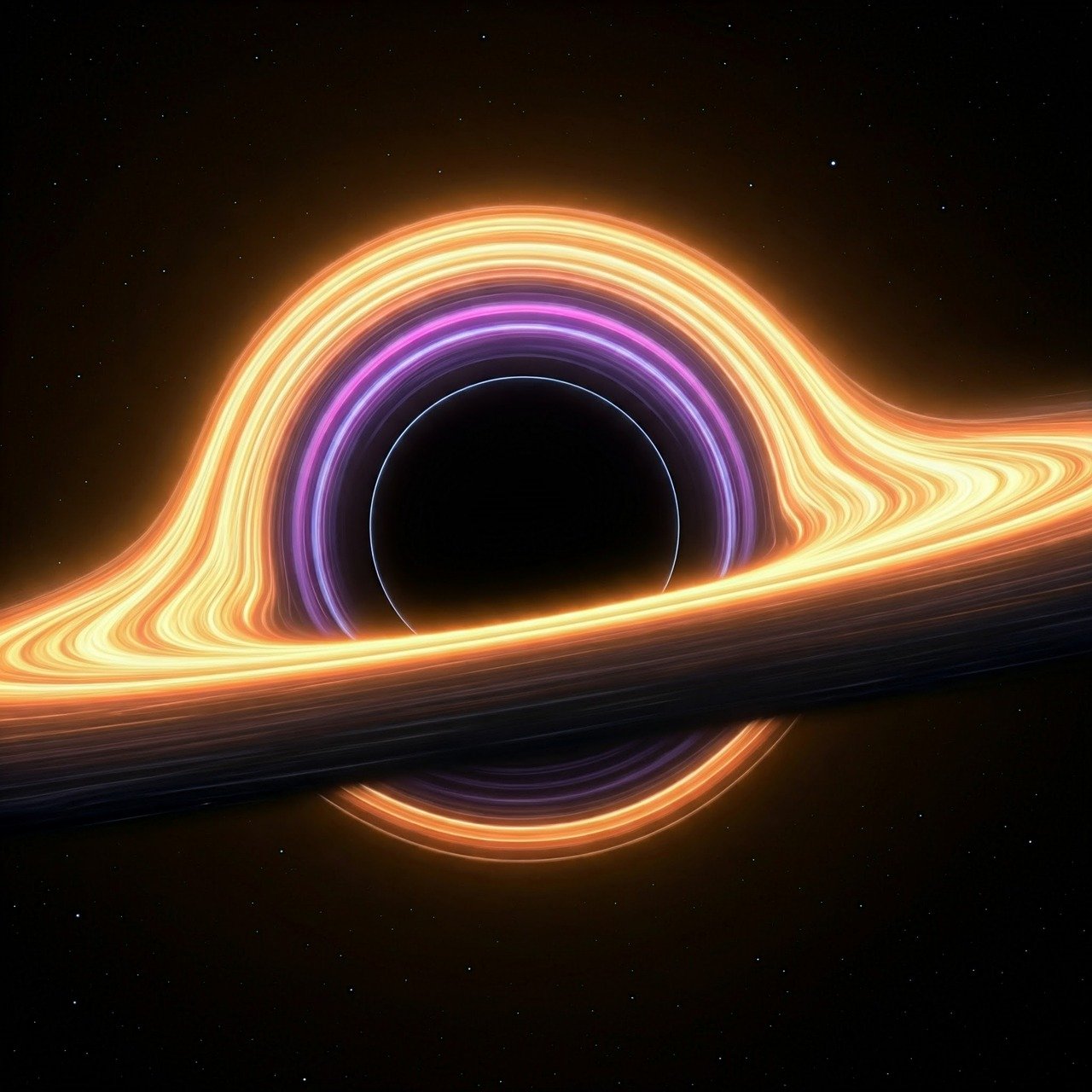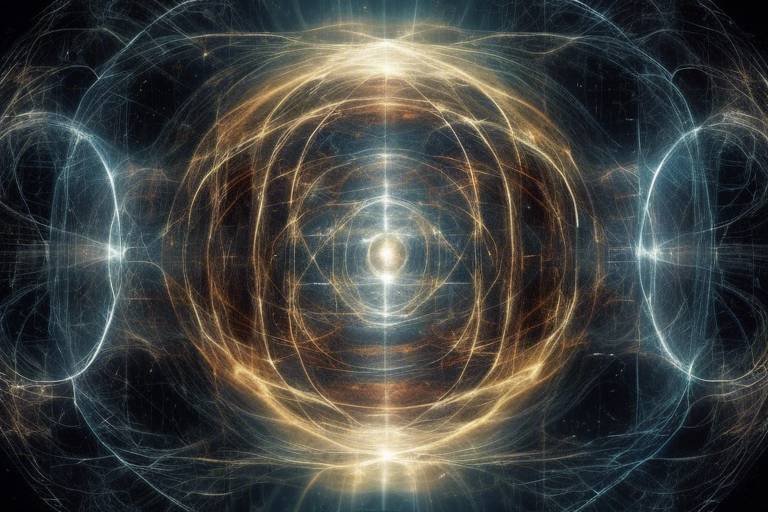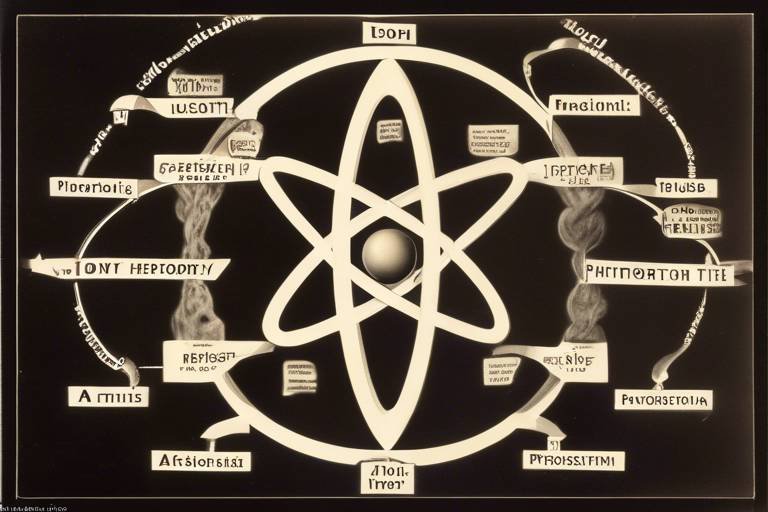The Philosophy of Quantum Mechanics - Does Reality Exist Without Observation?
Welcome to the fascinating world of quantum mechanics, where the very fabric of reality begins to unravel in the most astonishing ways! Have you ever pondered whether something exists if no one is there to observe it? This question lies at the heart of quantum mechanics, a field that challenges our intuitive understanding of the universe. As we dive into this topic, we will explore the philosophical implications of quantum mechanics, particularly focusing on the role of observation in shaping reality. Buckle up, because this journey will take us through mind-bending concepts and interpretations that could change how we perceive existence itself!
At its core, quantum mechanics reveals a universe that is not as straightforward as it seems. Imagine a world where particles can exist in multiple states at once, only to collapse into a single state the moment we look at them. This phenomenon raises profound questions about the nature of reality. Are we mere spectators in a cosmic play, or do our observations actively shape the script? To answer these questions, we will delve into key concepts such as the observer effect, wave-particle duality, and various interpretations of quantum mechanics, including the Copenhagen interpretation and the Many-Worlds Interpretation.
The implications of quantum mechanics extend beyond the laboratory and into the realm of philosophy. They challenge our understanding of free will, consciousness, and existence itself. As we navigate through these intricate ideas, we will uncover how different philosophical perspectives interpret the findings of quantum mechanics and how they influence our understanding of reality. So, is reality merely an illusion, or does it hold substance independent of our observation? Let’s embark on this intellectual adventure together!
The observer effect is one of the most intriguing concepts in quantum mechanics. It refers to the phenomenon where the act of observing a quantum system can change its state. Imagine you're watching a butterfly; your mere presence could alter its flight pattern. In the quantum realm, this is not just a metaphor—it's a fundamental truth. When we measure or observe particles, we inadvertently influence their behavior, which leads to the question: does reality exist independently of our observations?
This effect suggests that particles do not have definite properties until they are measured. For instance, an electron can exist in a cloud of probabilities, embodying multiple potential states until an observation is made. This raises philosophical dilemmas about the nature of reality itself. If our observations shape the very essence of particles, can we truly claim to know what exists when we are not looking? The implications are staggering, as they challenge our classical understanding of an objective reality.
Wave-particle duality is another cornerstone of quantum mechanics that complicates our perception of reality. It reveals that entities such as electrons and photons can exhibit properties of both particles and waves. Imagine trying to catch a fish with a net; sometimes it behaves like a solid object, while at other times, it flows like water. This duality forces us to reconsider the classical definitions of 'particle' and 'wave,' suggesting that the universe operates on a much more complex level than we ever imagined.
The Copenhagen interpretation is one of the most widely accepted interpretations of quantum mechanics. It posits that quantum systems exist in a state of superposition—meaning they can occupy multiple states at once—until an observation is made. This interpretation has profound implications for our understanding of reality. If particles exist in a haze of possibilities, then what does it mean to say something 'exists'?
In the Copenhagen interpretation, the observer plays a crucial role. The act of measurement collapses the wave function, determining the state of the particle. This leads to a tantalizing question: does observation create reality, or does it merely reveal a pre-existing one? Some argue that consciousness is integral to this process, suggesting that our minds may hold the key to understanding the universe. This notion opens a Pandora's box of philosophical debates about the nature of consciousness and its relationship to reality.
Despite its popularity, the Copenhagen interpretation has faced significant criticism. Detractors argue that it is incomplete and fails to provide a clear picture of reality. Alternative interpretations, such as the Many-Worlds Interpretation, propose radically different views on how we understand quantum mechanics. These critiques challenge us to rethink the implications of observation and the nature of existence itself.
The Many-Worlds Interpretation suggests that all possible outcomes of quantum measurements occur in separate, branching universes. This means that every time a quantum event takes place, the universe splits into multiple realities, each representing a different outcome. This interpretation dramatically alters our understanding of reality, suggesting that every decision creates a new universe. Imagine living in a multiverse where every choice you make spawns a new reality—how mind-blowing is that?
The philosophical implications of quantum mechanics extend to the concept of free will. If quantum indeterminacy allows for genuine choice, does this mean we have the freedom to shape our destinies? Or does the randomness inherent in quantum mechanics undermine the notion of free will altogether? These questions lead us to explore the relationship between determinism and randomness, and how they inform our understanding of existence.
Quantum randomness introduces a level of unpredictability that challenges deterministic views of the universe. If outcomes are not predetermined, then does this open the door for free will? Or does it simply mean that our choices are the result of chaotic processes? Understanding how quantum randomness interacts with our perceptions of reality can help us navigate the philosophical terrain surrounding free will.
Various philosophical perspectives offer differing interpretations of quantum mechanics. From realism to idealism, each viewpoint shapes our understanding of existence and reality. Some philosophers argue that quantum mechanics supports a non-materialistic view of the universe, while others contend that it reinforces traditional notions of physical reality. Engaging with these perspectives can enrich our understanding of the profound questions posed by quantum mechanics.
- What is the observer effect?
The observer effect refers to how the act of measuring a quantum system can influence its state. - What is wave-particle duality?
This concept suggests that particles can exhibit properties of both waves and particles, complicating our understanding of their nature. - How does the Copenhagen interpretation affect reality?
It posits that quantum systems exist in superposition until observed, raising questions about the nature of existence. - What is the Many-Worlds Interpretation?
This interpretation suggests that all possible outcomes of quantum measurements occur in separate, branching universes. - Does quantum mechanics imply we have free will?
The implications for free will are debated, with some arguing that quantum indeterminacy allows for genuine choice.

The Observer Effect
The observer effect is one of those mind-bending concepts in quantum mechanics that can make your head spin. Imagine a tiny particle, like an electron, behaving one way when you're not looking and another way entirely when you are. It's as if these particles have a secret life that only reveals itself when someone is peeking. This phenomenon raises profound questions about the nature of reality itself. Are we, as observers, actively shaping the universe around us? Or are we merely passive witnesses to a reality that exists independently of our observation?
At its core, the observer effect highlights the delicate dance between observation and reality. In classical physics, we often assume that the act of observing something doesn't change its state. However, in the quantum realm, the act of measurement seems to alter the very fabric of what we are trying to observe. For instance, when we measure the position of a particle, we can no longer know its momentum with the same certainty, and vice versa. This trade-off, known as the Heisenberg Uncertainty Principle, illustrates the fundamental limits of our knowledge about the quantum world.
To better understand the implications of the observer effect, let's consider a simple analogy. Think of a theater performance. When the audience is silent and attentive, the actors deliver their lines flawlessly, creating a seamless performance. However, if the audience starts to shout or distract the actors, the performance may falter. In this analogy, the audience represents the observer, and the actors symbolize the quantum particles. Just as the audience influences the performance, our observations can influence the behavior of quantum particles.
Now, let's delve into some key aspects of the observer effect:
- Measurement Influence: The act of measuring a quantum system often alters its state, leading to a collapse of the wave function. This means that the particle's behavior is not just a reflection of its inherent properties but is also influenced by our act of observation.
- Superposition: Before measurement, quantum particles exist in a state of superposition, where they can be in multiple states simultaneously. It's only upon observation that they 'choose' a definitive state.
- Philosophical Implications: If observation can influence reality, what does that mean for our understanding of the universe? Are we co-creators of reality, or do we merely uncover a pre-existing tapestry of existence?
As we explore the observer effect, we must also consider its broader implications. If our observations can change the outcome of quantum events, does this mean that consciousness plays a vital role in shaping reality? This tantalizing question has sparked debates among physicists and philosophers alike. Some argue that consciousness is fundamentally intertwined with the fabric of the universe, while others contend that the observer effect can be explained without invoking consciousness itself.
In conclusion, the observer effect serves as a reminder of the intricate relationship between observation and reality. It challenges our classical intuitions and invites us to reconsider what we think we know about the universe. Are we merely passive observers, or do we actively participate in the unfolding of reality? As we continue to explore the depths of quantum mechanics, these questions will remain at the forefront of scientific and philosophical inquiry.

Wave-Particle Duality
is one of the most fascinating and perplexing concepts in quantum mechanics. It challenges our traditional understanding of how particles behave, suggesting that entities at the quantum level can exhibit properties of both waves and particles. Imagine trying to catch a butterfly; sometimes it flutters around like a wave, and other times it lands still, resembling a particle. This duality not only complicates our perception of reality but also raises profound questions about the fundamental nature of existence.
The idea that light can behave both as a wave and as a particle was first popularized by the famous double-slit experiment. When light passes through two closely spaced slits, it creates an interference pattern typical of waves. However, when we observe the light, it behaves like a stream of particles, known as photons, hitting the screen one by one. This paradox leads us to ponder: does the act of observation change the behavior of light? Are we merely spectators in a grand cosmic play, or do we actually influence the performance?
To illustrate this concept further, let's break down the implications of wave-particle duality:
- Nature of Reality: Wave-particle duality suggests that reality is not as straightforward as we perceive. It challenges the classical notion that objects have definitive states independent of observation.
- Measurement Problem: The duality raises questions about the measurement process in quantum mechanics. What exactly happens when we measure a quantum system? Does it 'choose' a state, or do we simply gain knowledge about its existing state?
- Philosophical Implications: The duality of waves and particles invites philosophical debates about the nature of existence itself. Are we living in a reality that is constantly in flux, shaped by our observations?
Moreover, the implications of wave-particle duality extend beyond just light; it applies to all quantum particles, including electrons and even larger molecules. This universal principle suggests a deep interconnectedness in the fabric of reality. The question arises: if everything at the quantum level exhibits this duality, what does that mean for our everyday experiences? Are we, too, part of this intricate dance between waves and particles?
In summary, wave-particle duality is not merely a quirky aspect of quantum mechanics; it is a window into the complex and often counterintuitive nature of reality. As we delve deeper into this subject, we find ourselves grappling with the very essence of existence. Are we observers shaping reality, or are we simply part of a grand illusion? The answers may be as elusive as the particles themselves.

Copenhagen Interpretation
The is one of the most widely discussed frameworks for understanding quantum mechanics, and it raises some intriguing questions about the nature of reality itself. At its core, this interpretation suggests that quantum systems exist in a state of superposition—a condition where particles can be in multiple states at once—until they are observed. Imagine if you could be both asleep and awake at the same time; this is somewhat akin to what particles experience in the quantum realm. This idea not only challenges our classical understanding of reality but also forces us to reconsider the role of the observer in determining what is real.
According to the Copenhagen Interpretation, the act of measurement is crucial. When we observe a quantum system, it 'collapses' from its superposition into a single state. This brings forth the question: does reality exist independently of observation? If we take this interpretation at face value, it suggests that without an observer, the universe might be in a state of potentiality rather than actuality. In other words, the universe is not simply waiting to be discovered; rather, it is in a constant state of flux, influenced by our acts of measurement.
Let’s break down some key aspects of the Copenhagen Interpretation:
- Superposition: Particles can exist in multiple states simultaneously until observed.
- Wave Function Collapse: The act of measurement causes the wave function to collapse into one of the possible states.
- Observer Effect: The observer plays a critical role in determining the outcome of a quantum event.
This interpretation has profound implications for our understanding of reality and consciousness. If observation is necessary to 'create' reality, then what does that imply for the nature of existence? Are we, as conscious beings, integral to the universe's very fabric? These questions lead to deeper philosophical inquiries about the relationship between consciousness and reality.
However, the Copenhagen Interpretation is not without its critics. Many argue that it leaves too many questions unanswered, particularly regarding the nature of the observer and the reality of unobserved phenomena. This has led to the exploration of alternative interpretations, such as the Many-Worlds Interpretation, which posits that all potential outcomes occur, each in its own separate universe. But that’s a discussion for another time.
In conclusion, the Copenhagen Interpretation not only reshapes our understanding of quantum mechanics but also invites us to ponder our role in the universe. Are we mere observers, or do we actively participate in shaping reality? The answers remain elusive, but the journey into the depths of quantum philosophy is as fascinating as the science itself.

Role of the Observer
The role of the observer in quantum mechanics is a fascinating and often debated topic that raises profound questions about the nature of reality itself. At the heart of this discussion is the idea that observation is not just a passive act, but rather an active one that can fundamentally alter the state of a quantum system. Imagine a painter standing before a blank canvas; until they take that first brushstroke, the canvas holds infinite possibilities. Similarly, in quantum mechanics, particles exist in a state of superposition, where they can be in multiple states at once, until an observation is made. This leads us to ponder: does the act of observation create reality, or does it merely reveal what is already there?
The implications of this question are staggering. If observation is indeed a creator of reality, it suggests that our consciousness plays a vital role in shaping the universe around us. This idea can be unsettling, as it blurs the line between objective reality and subjective experience. To illustrate this, consider the famous thought experiment known as Schrödinger's cat, where a cat is simultaneously alive and dead until someone opens the box to check. This paradox highlights how the act of observing can collapse the quantum wave function, forcing the universe to choose one outcome over another.
Furthermore, the role of the observer raises intriguing questions about consciousness itself. Are we merely passive witnesses to a pre-existing reality, or active participants in its unfolding? Some theorists argue that consciousness is a fundamental component of the universe, while others contend that it is merely an emergent property of complex systems. This debate is ongoing and is central to our understanding of both quantum mechanics and the nature of existence.
To better understand the implications of the observer's role, let's consider some key points:
- Observation influences outcomes: Quantum systems can behave differently when they are being observed.
- Consciousness and reality: The relationship between the observer and the observed raises questions about the nature of consciousness.
- Philosophical implications: These concepts challenge our traditional notions of reality and existence.
In conclusion, the role of the observer in quantum mechanics is not just a scientific curiosity; it is a profound philosophical inquiry that forces us to reconsider our understanding of reality. As we delve deeper into the quantum realm, we must grapple with the implications of our observations and the nature of existence itself. Are we shaping the universe with our mere presence, or are we simply uncovering its hidden truths? The answer may hold the key to understanding not only the universe but also our place within it.

Critiques of the Copenhagen Interpretation
The Copenhagen interpretation, though widely accepted, has not escaped scrutiny and criticism from various corners of the scientific and philosophical communities. One of the primary critiques revolves around its reliance on the act of observation. Critics argue that this reliance suggests a peculiar dependency of reality on consciousness, which raises more questions than it answers. If reality is contingent upon observation, then what happens to unobserved phenomena? Are they merely figments of our imagination, or do they possess an existence independent of our awareness? This slippery slope leads to profound implications for our understanding of existence itself.
Furthermore, the Copenhagen interpretation introduces a level of ambiguity that many find unsettling. For instance, the concept of superposition—where a particle exists in multiple states until observed—can be perplexing. Is it truly possible for something to exist in a state of uncertainty? This ambiguity leads to a sense of discomfort among those who prefer a more deterministic view of the universe. In fact, some physicists argue that the Copenhagen interpretation fails to provide a complete description of quantum phenomena, leaving gaps that demand further exploration.
To illustrate these critiques, let’s consider a few key points:
- Measurement Problem: Critics assert that the Copenhagen interpretation does not adequately explain the transition from quantum superposition to a single outcome upon measurement. This gap in understanding is often referred to as the measurement problem.
- Observer's Role: The necessity of an observer implies that consciousness plays a pivotal role in shaping reality, which many argue is an untenable position. If reality is dependent on observation, does that mean unobserved events lack reality?
- Alternative Theories: The existence of alternative interpretations, such as the Many-Worlds Interpretation and de Broglie-Bohm theory, suggests that there are other frameworks that may offer a more coherent understanding of quantum mechanics.
Moreover, the Copenhagen interpretation has been criticized for its lack of predictive power in certain scenarios. While it can accurately describe many quantum phenomena, there are instances where it falls short. For instance, when dealing with entangled particles, the interpretation fails to provide a clear mechanism for how information is transmitted between them, leading to what Einstein famously referred to as "spooky action at a distance." This critique not only questions the completeness of the Copenhagen interpretation but also its applicability in explaining the intricacies of quantum mechanics.
In summary, the critiques of the Copenhagen interpretation highlight significant philosophical and scientific challenges. While it has been instrumental in advancing our understanding of quantum mechanics, the questions it raises about the nature of reality and the role of observation continue to fuel debate among physicists and philosophers alike. As we delve deeper into the quantum realm, it becomes increasingly clear that our understanding of reality is far from settled.
- What is the Copenhagen interpretation? The Copenhagen interpretation is a fundamental theory in quantum mechanics that posits particles exist in a state of superposition until observed, at which point they assume a definite state.
- What are the main critiques of the Copenhagen interpretation? Critics argue it relies too heavily on observation, raises questions about the role of consciousness, and lacks predictive power in certain scenarios.
- Are there alternatives to the Copenhagen interpretation? Yes, alternatives such as the Many-Worlds Interpretation and de Broglie-Bohm theory offer different perspectives on quantum phenomena.
- How does the Copenhagen interpretation affect our understanding of reality? It suggests that reality may not be absolute and could depend on observation, leading to philosophical implications about existence and consciousness.

Many-Worlds Interpretation
The (MWI) of quantum mechanics is nothing short of a mind-bending concept that reshapes our understanding of reality. Imagine a vast multiverse, where every possible outcome of a quantum event actually occurs, but in separate, branching universes. It’s like flipping a coin; in one universe, you get heads, and in another, tails. This interpretation suggests that instead of collapsing into a single outcome when observed, quantum systems split into multiple realities, each representing a different outcome. This idea challenges our conventional perception of existence and raises profound questions about the nature of reality itself.
At its core, the MWI eliminates the need for an observer to determine the state of a quantum system. In this framework, the universe is constantly splitting into a multitude of paths, each reflecting different choices and outcomes. The implications are staggering: every decision you make, every random event that occurs, spawns an entirely new universe. You might be wondering, does this mean there’s a version of you that chose differently at every crossroads? The answer is a resounding yes! In the MWI, every conceivable version of you exists somewhere in the vast tapestry of the multiverse.
One of the most fascinating aspects of the Many-Worlds Interpretation is how it tackles the concept of determinism. While classical physics often leans towards a deterministic view of the universe, MWI introduces an element of indeterminacy without discarding the overall coherence of the universe. It suggests that while we may not know which branch of reality we find ourselves in, all possibilities are realized somewhere. This perspective can be both liberating and daunting; it implies a sense of freedom, yet it also hints at an infinite number of choices that could have been made.
Despite its intriguing nature, the Many-Worlds Interpretation is not without its critics. Some argue that it complicates things unnecessarily, introducing a plethora of unobservable realities. Critics often ask, how can we ever prove or disprove the existence of these alternate universes? This leads to a fundamental philosophical debate about the nature of reality and our ability to understand it. Are we merely observers in a single universe, or do we have the potential to tap into a multiverse of possibilities? The MWI beckons us to consider the limits of our perception and the nature of existence itself.
In summary, the Many-Worlds Interpretation invites us to ponder the very fabric of reality. It challenges our understanding of choice, existence, and the role of observation. As we explore the implications of this interpretation, we are left with more questions than answers, yet it opens the door to a universe filled with infinite possibilities. Each decision, each quantum event, reverberates through the multiverse, creating a rich tapestry of realities waiting to be explored.

Implications for Free Will
The implications of quantum mechanics on the concept of free will are as profound as they are perplexing. At the heart of this discussion lies a fundamental question: Do we truly have the ability to make choices, or is everything predetermined? In classical physics, the universe operates like a well-oiled machine, where every action has a precise cause. However, the unpredictable nature of quantum mechanics introduces a level of randomness that challenges this deterministic view.
Imagine a game of dice—if you roll a die, the outcome is uncertain, and while you can influence the game by choosing when to roll, the result is ultimately left to chance. Similarly, quantum mechanics suggests that at a fundamental level, events may not be as predictable as we once thought. This quantum randomness raises intriguing questions about whether our decisions are genuinely ours or merely a product of random quantum fluctuations.
To further explore this, consider the following points:
- Quantum Indeterminacy: Quantum mechanics introduces the idea that particles can exist in multiple states simultaneously until observed. This indeterminacy might imply that our choices are not strictly bound by past events.
- Consciousness and Observation: Some interpretations propose that consciousness plays a role in collapsing the wave function, suggesting that our awareness might influence outcomes. Does this mean our conscious choices can affect reality?
- Determinism vs. Free Will: If quantum events are random, does that mean our choices are also random? Or can we reconcile quantum randomness with a sense of agency?
These considerations lead us to ponder whether free will exists in a world governed by quantum mechanics. Some philosophers argue that if quantum events are inherently probabilistic, then our decisions may also be subject to this unpredictability. In this view, free will could be seen as a form of controlled randomness, where we navigate through a landscape of possibilities shaped by both chance and choice.
On the flip side, critics of this perspective assert that randomness does not equate to freedom. They argue that if our choices are merely the result of random quantum fluctuations, then we lack true control over our actions. In essence, they posit that for free will to exist, our decisions must be grounded in more than just chance.
Ultimately, the relationship between quantum mechanics and free will remains a topic of heated debate. As we delve deeper into the mysteries of the quantum realm, our understanding of existence, choice, and reality continues to evolve. The question remains: Are we the authors of our own destinies, or are we simply players in a cosmic game of chance?
- What is quantum indeterminacy?
Quantum indeterminacy refers to the idea that certain properties of particles, such as position and momentum, cannot be precisely known simultaneously, leading to inherent unpredictability in quantum systems. - Does quantum mechanics support the existence of free will?
The implications of quantum mechanics on free will are complex. While some argue that quantum randomness allows for genuine choice, others contend that randomness does not equate to true freedom. - How does the observer effect relate to free will?
The observer effect suggests that the act of measurement can influence the state of a quantum system. This raises questions about the role of consciousness in shaping reality and whether our choices are impactful.

Quantum Randomness
When we dive into the realm of quantum mechanics, one of the most astonishing concepts we encounter is . Unlike the predictable world of classical physics, where cause and effect reign supreme, quantum mechanics introduces a level of unpredictability that can leave even the most seasoned physicist scratching their head. Imagine flipping a coin, where you can confidently predict that it will either land on heads or tails. Now, picture a quantum system where the outcome is not just uncertain, but fundamentally random until it is observed. This is the essence of quantum randomness.
At the core of quantum randomness lies the idea that certain events at the quantum level do not have predetermined outcomes. For instance, when a particle is in a superposition of states, it exists in multiple possibilities simultaneously. Only when we measure it do we see it 'decide' on a specific state. This leads us to wonder: if outcomes are inherently random, what does that say about our understanding of determinism? Are our lives, like quantum particles, subject to the whims of chance?
To grasp the implications of quantum randomness, consider the famous double-slit experiment. When particles such as electrons are fired at a barrier with two slits, they create an interference pattern on a screen behind the barrier, suggesting that they behave like waves. However, when we observe which slit the electron passes through, the interference pattern disappears, and the electron behaves like a particle. This bizarre behavior raises profound questions about the nature of reality: does the act of observation change the outcome, or is it simply revealing a reality that was always there?
Quantum randomness challenges our intuitive notions of causality and predictability. In our daily lives, we are accustomed to making decisions based on past experiences and logical reasoning. However, in the quantum world, randomness reigns, and events can occur without a clear cause. This unpredictability can be likened to rolling a die; while we can calculate the odds of landing on a specific number, we cannot foresee the outcome of a single roll. This unpredictability is not just a quirk of quantum mechanics; it has real implications for our understanding of free will and determinism.
Moreover, the philosophical implications of quantum randomness extend beyond physics into the realm of existential inquiry. If quantum events are fundamentally random, does that mean our choices and actions are also subject to randomness? Or is there a deeper layer of reality that we have yet to uncover? These questions invite us to ponder the nature of existence itself.
In conclusion, quantum randomness is a fascinating and perplexing aspect of quantum mechanics. It forces us to reconsider our assumptions about reality, causality, and free will. As we continue to explore the quantum world, we may find that the answers we seek are as elusive as the particles themselves, forever dancing on the edge of uncertainty.
- What is quantum randomness? Quantum randomness refers to the inherent unpredictability of certain events at the quantum level, where outcomes are not predetermined until measured.
- How does quantum randomness affect free will? Quantum randomness raises questions about whether our choices are genuinely free or influenced by random quantum events.
- Can we predict quantum outcomes? While we can calculate probabilities for quantum outcomes, individual events remain fundamentally unpredictable.
- What is the double-slit experiment? The double-slit experiment demonstrates the wave-particle duality of quantum particles, showing how observation affects their behavior.

Philosophical Perspectives
The world of quantum mechanics isn't just a playground for physicists; it’s a rich tapestry of philosophical inquiry that challenges our very understanding of existence. When we dive into the philosophical perspectives surrounding quantum mechanics, we find ourselves at a crossroads between science and philosophy. At the heart of this discussion is the question: What does it mean to exist? Various philosophers have attempted to tackle this question, offering interpretations that range from the deeply skeptical to the profoundly optimistic.
One of the most intriguing perspectives comes from the realm of idealism, which posits that reality is fundamentally mental. According to this view, the act of observation is not just a passive reception of information but an active participation in the creation of reality. This idea resonates with the observer effect in quantum mechanics, where the mere act of measurement seems to alter the state of a particle. Idealists might argue that consciousness is the bedrock of existence, suggesting that reality is contingent upon our awareness of it. Imagine a stage where actors perform; without an audience, do they truly exist? This metaphor captures the essence of idealism in the quantum realm.
On the flip side, we have realism, which stands in stark contrast to idealism. Realists argue that the universe exists independently of our observations. They maintain that particles have definite properties regardless of whether we are looking at them or not. This perspective aligns with the classical view of physics, where objects have intrinsic qualities. However, the implications of quantum mechanics challenge this notion. If particles can exist in multiple states until observed, how can we reconcile this with a realist perspective? It’s like trying to catch a shadow; it’s there, but it defies being pinned down. This ongoing tug-of-war between idealism and realism highlights the complexity of understanding reality through the lens of quantum mechanics.
Another fascinating angle is the concept of existentialism, which emphasizes individual experience and the search for meaning. Existentialists might say that the uncertainty inherent in quantum mechanics mirrors the unpredictability of human existence. Just as particles behave unpredictably, so too do our lives unfold in unexpected ways. This perspective invites us to embrace the chaos and find meaning within it. In a universe where outcomes are not predetermined, we are reminded of our freedom to choose and shape our destinies. It’s a liberating thought, akin to being handed a blank canvas where we are free to paint our own realities.
Moreover, the interpretation of quantum mechanics has led to the development of post-quantum theories, which seek to address the limitations of current quantum interpretations. These theories suggest that there may be hidden variables that determine the behavior of particles, potentially restoring a sense of determinism to the universe. This perspective raises questions about the nature of reality and whether it is truly random or merely appears so due to our limited understanding. It’s like trying to solve a jigsaw puzzle with missing pieces; the picture remains incomplete until we find the hidden variables that could complete the scene.
In summary, the philosophical perspectives on quantum mechanics offer a kaleidoscope of interpretations that challenge our conventional understanding of reality. Whether one leans towards idealism, realism, existentialism, or post-quantum theories, the discussions provoke profound questions about existence, observation, and the nature of reality itself. As we explore these ideas, we are reminded that the universe is not merely a collection of particles and waves; it is a rich, intricate web of meaning waiting to be unraveled.
- What is the observer effect in quantum mechanics?
The observer effect refers to changes that the act of observation can make on a quantum system. It suggests that the mere act of measuring a particle can affect its state.
- How does wave-particle duality challenge classical physics?
Wave-particle duality indicates that particles, such as electrons, can exhibit properties of both waves and particles, contradicting classical physics that categorizes entities as one or the other.
- What are the implications of the Copenhagen interpretation?
The Copenhagen interpretation posits that quantum systems exist in a state of superposition until observed, raising questions about the nature of reality and the role of consciousness.
- What is the Many-Worlds Interpretation?
The Many-Worlds Interpretation suggests that all possible outcomes of quantum measurements occur in separate, branching universes, fundamentally changing our understanding of reality.
Frequently Asked Questions
- What is the observer effect in quantum mechanics?
The observer effect refers to the phenomenon where the act of observing a quantum system can alter its state. In simple terms, when we measure or observe particles, we can change their behavior. This raises intriguing questions about reality—does it exist independently of our observation, or is it shaped by our perceptions?
- Can you explain wave-particle duality?
Wave-particle duality is a fundamental concept in quantum mechanics that suggests entities like electrons exhibit both wave-like and particle-like properties. Imagine trying to catch a wave at the beach; sometimes it feels solid, and other times it's fluid. This dual nature complicates our understanding of reality, making it clear that the universe doesn't always fit into neat categories.
- What is the Copenhagen interpretation?
The Copenhagen interpretation posits that quantum systems exist in a state of superposition until they are observed. Think of it like a coin spinning in the air; it's neither heads nor tails until you catch it. This interpretation suggests that our observations play a crucial role in determining reality, leading to philosophical debates about the nature of existence itself.
- How does the role of the observer affect reality?
The role of the observer in quantum mechanics raises profound questions about consciousness. Are we actively creating reality through observation, or are we simply revealing what already exists? This leads to a fascinating exploration of whether our perceptions shape the universe or if the universe exists independently of us.
- What are the critiques of the Copenhagen interpretation?
Critics argue that the Copenhagen interpretation is incomplete because it relies heavily on the act of measurement. Alternative interpretations, such as the Many-Worlds Interpretation, suggest that all possible outcomes occur in parallel universes. This opens up a whole new realm of understanding reality beyond mere observation.
- What is the Many-Worlds Interpretation?
The Many-Worlds Interpretation posits that every quantum event branches into multiple outcomes, creating parallel universes for each possibility. It's like a choose-your-own-adventure book where every decision leads to a different storyline. This interpretation challenges our traditional understanding of reality, suggesting that all possibilities coexist simultaneously.
- How does quantum mechanics relate to free will?
The implications of quantum mechanics extend to the concept of free will. Some argue that quantum indeterminacy allows for genuine choices, while others believe it undermines the notion of free will entirely. It's a bit like rolling dice; while the outcome is unpredictable, the act of rolling still involves a choice. This debate continues to spark discussions about determinism and autonomy.
- What is quantum randomness?
Quantum randomness introduces an element of unpredictability in outcomes, challenging the classical view of determinism. It's akin to flipping a coin; while you can predict the odds, the result is ultimately random. This randomness poses questions about how much control we really have over our reality and decisions.
- What philosophical perspectives exist regarding quantum mechanics?
Various philosophical perspectives offer differing interpretations of quantum mechanics, influencing our understanding of existence. Some philosophies embrace the uncertainty and complexity of quantum phenomena, while others seek to find a more deterministic framework. It's a vast landscape of ideas, each contributing to our quest for understanding the nature of reality.



















